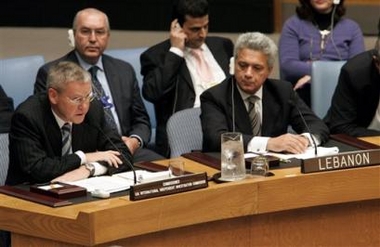|
Nations threaten Syria with sanctions
(AP)
Updated: 2005-10-26 09:08
The United States, France and Britain on Tuesday demanded that Syria detain
government officials suspected of involvement in the assassination of a former
Lebanese prime minister and ensure their cooperation with a U.N. probe or face
possible sanctions.
The call was contained in a strongly worded draft resolution that orders
Syria to make the suspected officials or individuals "fully and unconditionally
available" to investigators who have accused Syria of obstructing their work.
That language was a clear attempt to pressure Syria into giving the probe
access to top security officials — possibly including the brother-in-law of
President Bashar Assad — who may have been involved in the Feb. 14 assassination
of Rafik Hariri.
In a report released last week, Mehlis implicated top Syrian and Lebanese
security officials in the assassination and said Syria was not cooperating fully
with his probe. Syria hotly denies those claims.
The central challenge now for the resolution will be getting the support of
Russia and China, which have been hesitant to use the threat of sanctions to
back up a call for more Syrian cooperation.
President Bush insisted Tuesday that the United Nations hold Syrian leaders
"accountable for their continuing support of terrorism."

German prosecutor Detlev Mehlis, left, briefs
the U.N. Security Council on his report regarding the assassination of
Lebanon's former Prime Minister Rafik Hariri at U.N. headquarters in New
York on Tuesday Oct. 25, 2005.[AP] | Yet Russian
President Vladimir Putin, in a phone conversation Tuesday with Assad, welcomed
Syria's stated willingness to cooperate with the investigation and emphasized
that the council must proceed carefully.
The two discussed the "urgent need for cautious action by the international
community in order to prevent the emergence of new sources of tension in the
region," the Kremlin said in a statement.
The new draft spells out a list of stern measures against Syria.
It would slap an immediate travel ban and asset freeze on suspects identified
by the commission.
It states that Syria must allow interviews to take place outside the country
and without Syrian official presence — a key concern of the chief U.N.
investigator, Detlev Mehlis.
"I think we've learned something about trying to
interview witnesses in an authoritarian society," U.S. Ambassador John Bolton
said in a reference to U.S. efforts to interview Iraqi scientists during its
hunt for weapons of mass destruction.
|